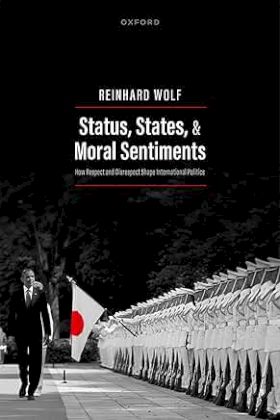16 July 2025
Status, States and Moral Sentiments
Reinhard Wolf
2025, Oxford University Press, 320 pages,
ISBN 9780198941965
Reviewer: Bridget Rosewell

This book is not quite what I expected from the title. I expected something building on Adam Smith and the relationship between economic, cost benefit approaches in international relations and one which brought moral approaches to bear on these matters. I imagine I was thinking along the lines of the arguments raised by authors such as John Kay and Paul Collier about the importance of social consensus. And I also thought that such matters might be quite important in these fractious times where negotiation may turn to open war.
Instead, it is about the small print in the title – How Respect and Disrespect Shape International Politics. It is divided into two parts, the first works on the theory of the relationship between respect, recognition, status and prestige. For students of international relations this might to very interesting, but to be honest many economists would find it rather jargon ridden. This is not to say economists don’t do jargon, but other subjects’ jargon is not ours. Rather salutary to have to look up what ontological security means (your categories of meaning and not challenged by experience – I think).
Having said this, let me try to summarise the argument that Wolf then illustrates with three case studies. First, respect is a relational concept that illustrates one agent’s attitude to another agent’s status. Second, there are various means by which recognition of this respect is achieved – this is crucial in international relations. Such recognition applies to all sides of the respect relation and can be perceived differently. By different sides. Deference is important in making the status relation visible but can also be interpreted differently in different cultures.
The three case studies that Wolf uses to illustrate these themes are the relations between Russia and the West, and how this is affected by Russia wishing to be seen as a great power with equal rights while believing that Washington disrespected this requirement. The second case study looks at the Greek debt crisis and how an experience of disrespect generated such anger that it eclipsed strategic considerations of costs and benefits. The third case study looks at US-North Korea relations during the first Trump presidency. It looks at how disrespect turned to respect but how the negatives of disrespect are stronger than the positives of respect so that avoiding disrespect is more useful than trying to reverse it.
In conclusion, he suggests that ensuring that mutual respect turns into a win-win rather than a zero-sum rivalry is easier said than done. Parties may have very different cultural markers about what constitutes signals of respect, as anyone who has done business in Asia must be able to testify. The acceptance by others of status markers can be more important than the sort of cost benefit analysis beloved of economists.
Perhaps an example worthy of more reflection is the experience of Brexit – both the campaign, its outcome and its continuing heft. Economists, inured to the rationality of free trade, were largely in favour of Remain. Their own status markers and the need for recognition of ‘rational’ analysis, made this perhaps inevitable. But for others a sense of disrespect, particularly in the return of Cameron from Brussels with no obvious concessions, and building on previous losses of face, made the result of the referendum much more explicable.
The classic Monty Python sketch asks ‘what did the Romans do for us’? The rationalist answer of roads, baths and so on cuts no ice with a crowd whose sense of disrespect of their history, culture, traditions and self-government is much more powerful.
I’m not sure why Wolf does not bring to bear references to both more immediate and more intractable challenges. The struggle over the Middle East comes to mind. An attempt at genocide might be the most stringent form of disrespect that could be imagined, and it was practised against Jews in the Second World War. No wonder that a desire for secure territory and respect for its occupation was essential for many (though not all) Jews who set up the state of Israel. At the same time, there was scant respect for the rights of the Palestinians already resident. Add in religious tensions and the taking of sides by third parties and it is easy to see why this struggle is so hard to solve. It has nothing to do with the calculation of costs and benefits and attempts to set solutions in that light achieve nothing.
Closer to home, consider the Irish situation. Outside the House of Commons there stands a statue of Oliver Cromwell, supporter of the rights of Parliament – well up to a point. But not at all a supporter or respecter of the rights of the Irish. In 1919, the Irish hoped to use the Versailles conference at the end of the First World War to gain support for their independence as a small nation and using Woodrow Wilson’s principles of respect for such rights. But such respect could only apply to small nations on the losing, not the winning side. They gained no seat at the table and this intensified the sense of ‘700 years of oppression’ by the British or just the English state. A more nuanced solution might have been more economically successful but couldn’t get past the issues of respect.
Humans are not calculating machines. Context, history, emotion, all contribute to decision making by individuals and their states. They should not, and cannot, be ignored.
